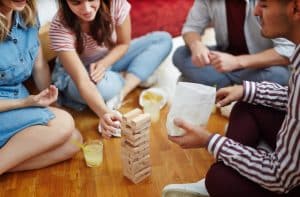In recent years, polyamory has gained recognition in popular culture, offering meaningful and fulfilling connections to many people who do not resonate with more traditional, binary relationship models. However, this type of relationship has also been reduced to a “fad” or trend in public discourse and is often the subject of much-misunderstood debate.

Traditional, “nuclear family”-style relationship structures have long since become the exception and not the rule, making room for a wider range of relationship structures. So, what part does polyamory play in this? How does it fulfil the emotional, physical, and emotional needs of those who practice it?
Polyamory – what it is and what it isn’t
Polyamory is a combination of the Greek word “poly”, meaning “many”, and the Latin word “amor”, meaning “love”, and involves having relationships with multiple partners.
Polyamorous relationships, like all other relationships, thrive on the foundations of open and honest communication, clearly defined boundaries and a mutual commitment to the success of the relationships among all involved.
Contrary to the popular beliefs held by many that polyamorous relationships are a contemporary phenomenon and can’t possibly sustain or succeed, polyamorous relationships have been featured consistently throughout human history. Historical texts from ancient Mesopotamia (dating back to around 2350 B.C.E) indicate that polyamory and polygamy were integrated into social norms, sometimes for legal reasons such as property and lineage, but also the sake of human connections.
It is crucial to note that, in some cultures, this took the form of polygamy, where one person married multiple spouses without necessarily focusing on emotional bonds. These often did not feature the emphasis on connection, consent and honest communication that are central to modern-day polyamory.

Relationship therapy and counselling can play a pivotal role in developing robust and effective techniques for communication and navigating multiple romantic connections. This support can be especially valuable for those near the start of their journey into polyamory. However, even those with years of experience in polyamorous relationships can still find therapy significantly beneficial as a method of ensuring ongoing self-reflection and ensuring actions and emotions are authentically aligned with their values, their partners and their lifestyle.
Why are some people poly?
Understanding the dynamics of relationship structures which diverge from conventional norms can be challenging. However, countless people have found love, acceptance, structure and fulfilment in polyamorous relationships. Some of the needs met by polyamory may include:
- Self-growth: polyamorous relationships can catalyse self-discovery and personal growth, allowing one to explore desires and establish clear, healthy boundaries.
- Emotional fulfilment: through polyamory, individuals can fulfil a range of emotional needs, fostering deep, meaningful connections with multiple partners.
- Communication: navigating the complexities of polyamory, including managing jealousy and coordinating schedules, enables people to focus on and boost their ability to engage in honest communication and emotional intelligence.
- Community: being part of a polyamorous community offers a sense of belonging, support, understanding, and shared experiences.
- Exploring identity and desire: polyamory allows individuals to discover, explore and express different facets of their identity and desires in a supportive environment.
Is polyamory for everyone?
Each of us has a deeply personal relationship style. Whether we choose monogamy or polyamory, we have to do what feels intrinsically right to us. Regardless of our desired relationship style, advocating for the legal and social acceptance of non-traditional relationship styles is constructive for us all.
As family lawyer Diana Adams, founder of the Chosen Family Law Centre, states in her TED talk, most people do not live in a nuclear family anymore. Single parents, adoptive parents, cohabiting couples, unmarried couples, same-sex parents, and wider family networks all play a much more central role in family life than in recent decades and centuries.
“An expansive view of family will strengthen all relationships.” – Diana Adams.
While polyamory may not align with everyone’s wishes and preferences, there are significant social and legal implications which may drive some people to avoid exploring polyamory despite a desire to. These concerns may include spousal and parental rights and fear of facing judgement or scepticism by friends, families and strangers.
Common polyamory myths and questions
Is polyamory new?
The term “polyamory” has only existed since the 1970s, but relationship styles, including multiple, committed, consensual partners, have existed since the B.C.E era.
Polyamory leads to more STIs
Whilst sex with multiple partners can increase the risk of sexually transmitted infections, studies show that polyamorous people tend to be more conscientious about safe sex and regular testing than most.
Is polyamory mostly about having sex?
Polyamory is a style of romance, dating and connecting, but it doesn’t necessarily have to be sexual, nor does it automatically include group sex. Some asexual people are polyamorous, and many polyamorous people have never had group sex.
Is polyamory for people who don’t want to commit?
Quite the opposite—polyamorous people commit to multiple people. However, this could become complicated in some practical ways—scheduling dates with conflicting calendars, for example. Working to communicate clearly and balance the needs of multiple people is a key element of polyamory.
Polyamory can’t work for people who get jealous
People who engage in polyamorous relationships are not immune to jealousy. The difference lies in perspectives of, and responses to, jealousy. In polyamorous relationships, jealousy is allowed to unfold naturally and can be discussed openly and honestly without inflicting shame on either party.
What is the difference between polyamory and ethical non-monogamy?
Polyamory is a type of ethical non-monogamy (ENM), defined by multiple relationships that function on an emotional as well as physical level. In ethical non-monogamy, people may also have partners outside of their relationships, with the consent of their partner, but these can be casual.
You must have multiple partners at all times to be polyamorous
Many people who identify with a polyamorous relationship do not have multiple partners all or even most of the time. Some people may only have one partner, who has another partner, who in turn has a partner. This is an example of polyamory consisting only of two-person relationships.
Polyamorous people can’t have families, and if they do, it’s bad for the children.
A recent 20-year study of polyamorous families with children has demonstrated that this is not a deciding factor – many healthy family environments with secure, confident children who felt loved were observed. This is not to state that polyamory is necessarily a better family structure, but no issues specific to polyamory were observed.
Professional, inclusive family counselling can be very helpful in addressing any parenting issues or concerns polyamorous people may have. Integrative family therapy can incorporate a deeper understanding of how past and societal influences may impact fears and anxieties with strategies for shaping a desired future family.

Embracing our chosen relationship styles is crucial for our well-being and emotional health, regardless of the form they take. While advocacy for traditional families may stem from good intentions or a protective stance towards established relationship norms, ultimately, the happiness, safety and fulfilment of the individual engaging in the relationship is paramount. We all love in our own way, and accepting and valuing someone’s unique experience is our most supportive action.
- About the Author
- Latest Posts
Co-founder and director of Leone Centre, 20+ years of experience supporting people, and offering valuable knowledge through Couples Counselling and Individual Counselling. Before becoming a therapist, I worked in the financial sector.

Get Started Today
with Leone Centre

BOOK NOW

Call us
020 3930 1007

View our therapists
Find your match


